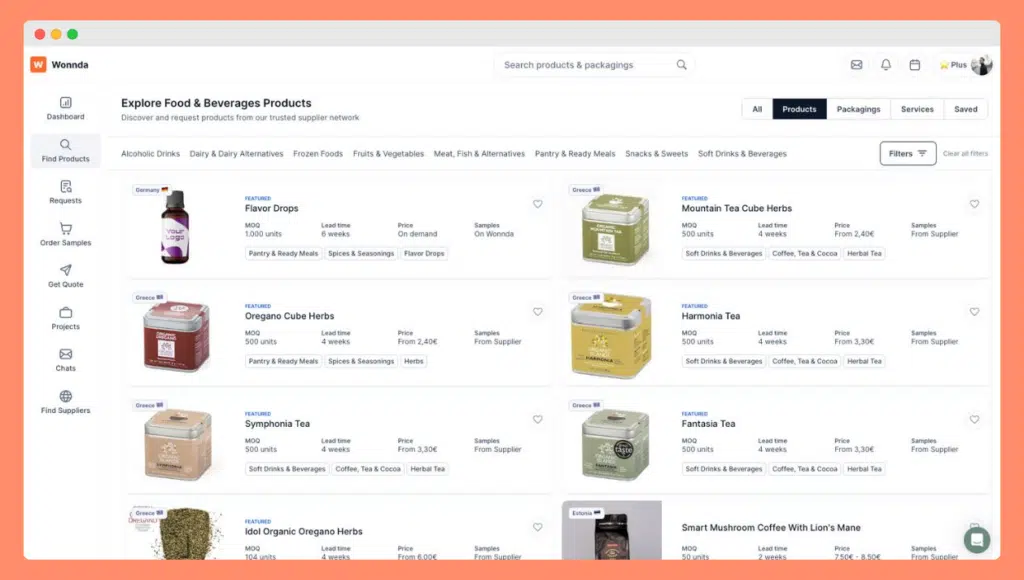Private Label – A Retailer’s Dream
Once there was a small shop owner named Alex. Alex’s shop was special because it had many unique things. But Alex wanted more – he dreamed of creating his own brand of products. This dream led Alex to try private labeling. In the year 2024, the world of private labeling is looking better than ever. There are many chances to succeed. This guide is like a helpful light for people like Alex who are ready to explore and succeed in the exciting but sometimes tough world of private labeling.
What is Private Label?
Private label refers to a brand owned not by a manufacturer but by a retailer or supplier who gets its goods made by a contract manufacturer under its own label. Essentially, products are manufactured by one company for sale under another company’s brand. Private labels are found in a wide range of industries from food to cosmetics.


Advantages and Disadvantages of Private Label
Private label products offer several advantages and disadvantages that are important to consider, especially for retailers and businesses looking to expand their product offerings.
Advantages of Private Label
Higher Profit Margins
Private label products often have higher margins than resale products, as retailers can save on marketing and brand development costs typically associated with manufacturer brands.
Brand Control
Retailers have more control over product specifications, pricing, and marketing strategies, allowing them to tailor products to their target audience.
Customer Loyalty
By offering unique products, retailers can cultivate a loyal customer base. When customers like a product that’s only available at a certain store, they tend to go back to that store to buy it again.
Market Flexibility
Retailers can quickly adapt private label products to changing market trends and customer feedback, allowing them to stay relevant and competitive.
Exclusivity
Private label products provide exclusivity. This exclusivity can be a selling point for the retailer and a reason for customers to choose their store over competitors.
Disadvantages of Private Label
High Initial Investment
Developing a private label brand can require a significant upfront investment in product development, manufacturing, and marketing.
Risk of Unsold Inventory
If the private label product does not resonate with customers, retailers may be left with unsold inventory, which can be a financial burden.
Quality Control
Retailers are responsible for ensuring product quality, which can be challenging, especially when dealing with multiple manufacturers or suppliers.
Brand Development Challenges
Building a new brand can be difficult and time-consuming. Private labels may struggle to achieve the same level of recognition and trust as established brands.
Dependence on Suppliers
Retailers may rely on specific suppliers for their private label products, and any issues with these suppliers (like production delays or quality issues) can directly impact the retailer.
In conclusion, while private label products offer the potential for higher profit margins and greater control over product offerings, they also come with risks like higher initial investments and challenges in quality control and brand development.
What is The Cost of Producing Private Label Products?
The cost of producing private label products can vary widely based on several factors, including the type of product, quality standards, manufacturing location, and volume of production. It’s important to note that private label products have grown in popularity due to various factors including price, quality, and sustainability concerns. This trend is driven by consumers’ increasing preference for private label products which are often seen as providing better value for money.
For a small to medium-sized batch of a relatively simple product, such as a private label food item or cosmetic product, initial costs could range from a few thousand euros to tens of thousands. More complex products, or those requiring significant customization or high-quality materials, could cost much more.
It’s advisable to request detailed quotes from several manufacturers for your specific product to get a more accurate estimate. Remember to factor in all associated costs, not just the basic manufacturing expenses.
Is It Worth Starting a Private Label Brand in 2024?
Starting a private label brand in 2024 can be a good business decision, given the current consumer trends and market dynamics. Consumers are increasingly turning to private labels for their value for money, especially in economically challenging times. Moreover, private labels have been improving in quality, making them more competitive against national brands.
However, success in private labeling requires focusing on innovation and aligning with consumer needs and preferences. Building loyal customer base has become more challenging, that requires a more targeted approach in marketing and product development. The key is to ensure your private label stands out not just for its price but also for its quality and desirability.



What Products can Be Sold Under Private Label?
A wide range of products can be sold under private labels. The choice of product often depends on market demand, the retailer’s target audience, and the ability to offer something unique or at a competitive price. Here are some common categories:
Food and Beverages
This includes packaged foods, healthy snacks, health foods, organic products, frozen foods and beverages. Private label food products are particularly popular in supermarkets and grocery stores.
Health and Beauty Products
These can range from skincare, haircare, and cosmetics to wellness supplements. The beauty and personal care industry is a significant sector for private label products.
Apparel and Accessories
Clothing, footwear, and fashion accessories can be effectively marketed under private labels, especially when they cater to specific fashion trends or niches.


Home and Kitchen Products
This category includes home decor, kitchenware, bedding, and other household goods. Private label brands in this sector often focus on offering unique designs or functional advantages.
Electronics
Although more challenging due to the technical aspects, private label electronics like small appliances, accessories, and gadgets are becoming increasingly common.
Pet Products
This includes pet food, accessories, and care products. The pet products sector has seen significant growth in private label offerings and is expected to scale more in 2024.
Baby Products
Items like baby food, diapers, and baby care products are often sold as private labels by retailers, focusing on quality and safety to build trust with consumers.
When creating a private label product, it’s essential to conduct market research to identify gaps in the market, understand consumer needs, and determine the most suitable products for your brand. Private labeling is an opportunity to cater to specific consumer segments with tailored products that reflect the brand’s identity and values.
Trending Private Label Products on Wonnda
On Wonnda, a platform specializing in connecting businesses with manufacturers for private label products, several trending products are capturing the market’s attention:
Mushroom-Infused Products
Gaining popularity for their health and wellness benefits, mushroom-infused products range from food and beverages to skincare items. Known for their adaptogenic properties, mushrooms like reishi, cordyceps, and chaga are increasingly being used in these products.
Facial Care Items
The demand for private label facial care products is on the rise, focusing on natural ingredients and sustainable packaging. These products cater to a variety of skincare needs, including anti-aging, moisturizing, and cleansing.
Vitamin Gummies
A fun and tasty way to consume vitamins, private label vitamin gummies are becoming a favorite among all age groups. These gummies are available in multiple flavors and formulations, targeting different health needs like immunity boost, energy, and overall wellness.
Dietary Supplements
With a growing focus on health and nutrition, dietary supplements are in high demand. Private label supplements are available in various forms, including tablets, capsules, gummies, sprays and powders, catering to a range of dietary needs and preferences.
Where to Find Private Label Manufacturers?
Finding private label manufacturers can be done through various methods, including online platforms, trade shows, and industry-specific directories. Here are some ideas for you:
Specialized Platforms like Wonnda
Wonnda is specifically designed for finding and collaborating with private label manufacturers mostly from Europe. It offers features that help in identifying suitable manufacturers for various product categories and facilitates the sourcing process.

Trade Shows and Expositions
Attending industry-specific trade shows is a great way to meet manufacturers in person. Events like the International Private Label Show (IPLS), PLMA’s “World of Private Label” International Trade Show, and various regional trade expositions provide opportunities to network and learn about new trends and suppliers.
Industry Publications and Directories
Industry-specific magazines and directories often list manufacturers. Publications like “Food & Drink Europe” or “Beauty Packaging” can be valuable resources, depending on your product category.
Referrals and Networking
Sometimes, the best way to find a reliable manufacturer is through business networking and referrals. Contacting industry peers, joining relevant forums, or engaging in online communities can provide leads.
How to Sell a Private Label Brand?
Selling a private label brand involves a series of strategic steps that include market research, branding, choosing the right sales channels, marketing, and customer engagement. Here’s a general guide on how to effectively sell a private label brand:
1. Conduct Market Research
Understand your target audience, their needs, preferences, and buying behavior. Identify gaps in the market where your product can fit in. Analyze your competitors to see what they are offering and how you can differentiate your brand.
2. Develop a Strong Brand Identity
Create a compelling brand name, logo, and design that resonates with your target audience. Your brand identity should reflect the values and quality of your products.
3. Quality Product Development
Ensure your product meets high-quality standards. The success of your private label brand heavily depends on the quality and uniqueness of your products.
4. Choose the Right Sales Channels
Decide where you want to sell your products. This could be online through e-commerce platforms like Amazon, eBay, or your own website, or offline in brick-and-mortar stores. Each channel has its own advantages and target audience.
5. Effective Online Presence
If selling online, ensure your product listings are professional and detailed. Use high-quality images, accurate descriptions, and include all the necessary information about the product.
6. Implement SEO Strategies
For online sales, use search engine optimization (SEO) to improve your product’s visibility on search engines. Utilize relevant keywords, quality content, and optimize your website or product listings.
7. Marketing and Advertising
Develop a marketing plan that includes various strategies like social media marketing, content marketing, email marketing, influencer marketing and paid advertising. The goal is to increase brand awareness and reach your target audience effectively.
8. Customer Reviews and Feedback
Encourage customers to leave reviews. Positive reviews can significantly influence the buying decision of potential customers. Address negative reviews promptly and constructively.
9. Analyze and Adapt
Regularly analyze the performance of your products and marketing campaigns. Be ready to adapt your strategies based on customer feedback and market trends.
Best Selling Examples of Private Label Brands
Some of the best-selling private label brands have become well-known for their quality, affordability, and strong customer loyalty. Here are a few notable examples:
AmazonBasics (Amazon): Launched by Amazon, AmazonBasics offers a wide range of products, from tech accessories to home goods. The brand is known for its affordability and decent quality.
Great Value (Walmart): Walmart’s Great Value brand offers a variety of grocery items and household products. The brand is popular for its affordability and wide availability.
Up & Up (Target): Target’s private label brand, Up & Up, includes health, home, and beauty products. Known for combining quality and value, Up & Up products often receive positive reviews.
Aldi Brands (Aldi): Aldi, a global discount supermarket chain, offers a variety of products under its own private labels. Aldi’s brands are known for their cost-effectiveness and quality.
These brands have successfully carved out a niche in their respective markets by offering quality products at competitive prices, thereby gaining a loyal customer base.